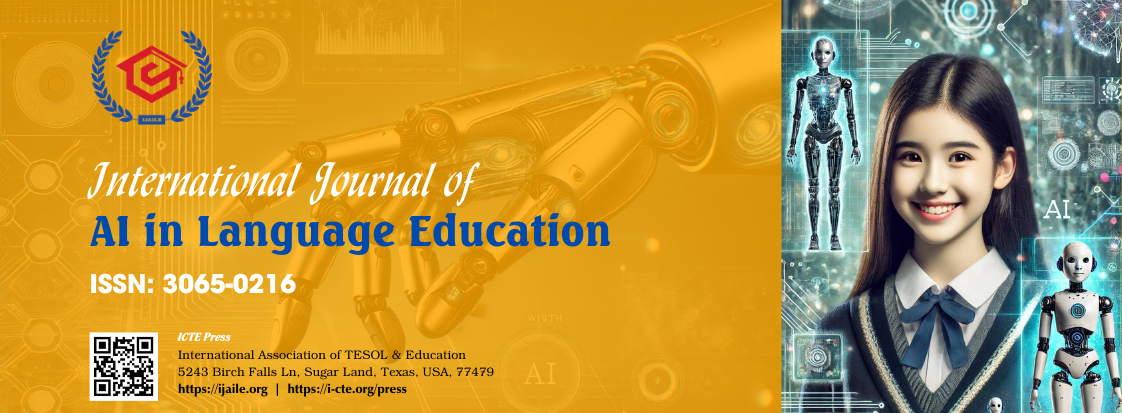Perceptions of Pre-service Kindergarten Teachers on Using ChatGPT to Support English Learning: A Mixed-Methods Study in Vietnam
DOI:
https://doi.org/10.54855/ijaile.25233Keywords:
ChatGPT, beginner level, English learningAbstract
The purpose of this study is to explore the perceived advantages and disadvantages of using ChatGPT to support English learning among pre-service kindergarten teachers at beginner proficiency levels. The study collected data from both questionnaires and semi-structured interviews. Results show that ChatGPT is perceived as a valuable tool for English language learning, providing quick answers, easy access, and great convenience, as well as personalized help and support in developing language skills. Participants emphasized reduced anxiety and increased motivation, confidence, and self-determination in learning. The results also reveal several drawbacks, including inconsistent or unclear responses, difficulty asking the right questions, information overload, technical limitations, and the risk of excessive reliance on the tool. As a result, equipping low-proficiency learners with basic AI digital literacy, including critical thinking and effective prompt creation, is very necessary to ensure the effective integration of ChatGPT into teaching practices. Besides, the paper discusses the teaching implications and further research to enhance English language education through ChatGPT for beginning-level learners.
References
Alele, F., & Malau-Aduli, B. (2023). An introduction to research methods for undergraduate health profession students. https://doi.org/10.25120/fh2z-yva8 DOI: https://doi.org/10.25120/fh2z-yva8
Bhandari, P. (2023, June 22). What is qualitative research? Methods & examples. Scribbr. Retrieved August 27, 2024, from https://www.scribbr.com/methodology/qualitative-research/
Brown, H. D., & Lee, H. (2015). Teaching by Principles: An Interactive Approach to Language Pedagogy. Pearson Education Limited.
Deci, E., & Ryan, R. M. (1985). Intrinsic motivation and self-determination in human behavior. Springer Science & Business Media. DOI: https://doi.org/10.1007/978-1-4899-2271-7
Harmer, J. (2015). The practice of English language teaching (5th ed.). Pearson Education Limited.
Ho, P. X. P. (2024). Using ChatGPT in English Language Learning: A study on I.T. students’ attitudes, habits, and perceptions. International Journal of TESOL & Education, 4(1), 55–68. https://doi.org/10.54855/ijte.24414 DOI: https://doi.org/10.54855/ijte.24414
Jamshed, M., Alam, I., Sultan, S. A., & Banu, S. (2024). Using artificial intelligence for English language learning: Saudi EFL learners’ opinions, attitudes and challenges. Journal of Education and e-Learning research, 11(1), 135–141. https://doi.org/10.20448/jeelr.v11i1.5397 DOI: https://doi.org/10.20448/jeelr.v11i1.5397
Liu, G. L., Darvin, R., & Ma, C. (2024). Exploring AI-mediated informal digital learning of English (AI-IDLE): a mixed-method investigation of Chinese EFL learners’ AI adoption and experiences. Computer Assisted Language Learning, 1–29. https://doi.org/10.1080/09588221.2024.2310288 DOI: https://doi.org/10.1080/09588221.2024.2310288
Ngo, K. T. (2024). The use of ChatGPT for vocabulary acquisition: A literature review. International Journal of AI in Language Education, 1(2), 1-17. https://doi.org/10.54855/ijaile.24121 DOI: https://doi.org/10.54855/ijaile.24121
Nguyen, H. A. (2024). Harnessing AI-based tools for enhancing English speaking proficiency: Impacts, challenges, and long-term engagement. International Journal of AI in Language Education, 1(2), 18–29. https://doi.org/10.54855/ijaile.24122 DOI: https://doi.org/10.54855/ijaile.24122
Neuman, W. L. (2014). Social research methods: Qualitative and quantitative approaches (7th ed.). Pearson.
Patton, M. Q. (2002). Qualitative research & evaluation methods (3rd ed.). Sage Publications.
Pham, M. T., & Cao, T. X. T. (2025). The practice of ChatGPT in English teaching and learning in Vietnam: A systematic review. International Journal of TESOL & Education, 5(1), 50-70. https://doi.org/10.54855/ijte.25513 DOI: https://doi.org/10.54855/ijte.25513
Pham T. T. D., & Luong, M. H. (2025). Students’ challenges in employing AI tools in legal writing. International Journal of TESOL & Education, 5(2), 75-86. https://i-jte.org/index.php/journal/article/view/526 DOI: https://doi.org/10.54855/ijte.25524
Pham, V. P. H., & Le, A. Q. (2024). ChatGPT in language learning: Perspectives from Vietnamese students in Vietnam and the USA. International Journal of Language Instruction, 3(2), 59–72. https://doi.org/10.54855/ijli.24325 DOI: https://doi.org/10.54855/ijli.24325
Tran, H. N., Le, T. T. N., & Tran, V. B. U. (2025). AI tools in learning academic writing: Benefits and challenges for MA students in the English language studies at the Industrial University of Ho Chi Minh City. International Journal of AI in Language Education, 2(1), 74-91. https://doi.org/10.54855/ijaile.25215 DOI: https://doi.org/10.54855/ijaile.25215
Tran, K. Q. (2024). The effects of integrating artificial intelligence into learning academic vocabulary among Master's students in English studies students. International Journal of AI in Language Education, 1(1), 1-19. https://doi.org/10.54855/ijaile.24111 DOI: https://doi.org/10.54855/ijaile.24111
Van Horn, K. R. (2024). ChatGPT in English language learning: Exploring perceptions and promoting autonomy in a university EFL context. Teaching English as a Second Language Electronic Journal (TESL-EJ), 28(1), 1-26. https://eric.ed.gov/?id=EJ1433988 DOI: https://doi.org/10.55593/ej.28109a8
Downloads
Published
Issue
Section
License
Copyright (c) 2025 Pham Thanh Su, Nguyen Ly Nhu Quynh (Author)

This work is licensed under a Creative Commons Attribution 4.0 International License.












